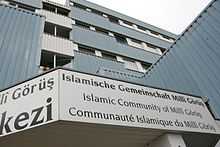Millî Görüş
Millî Görüş (literally English: National Vision) has been called one of "the leading Turkish diaspora organizations in Europe"[1] and also described as the largest Islamic organization operating in the West.[2] Founded in 1969, the movement claimed to have "87,000 members across Europe, including 50,000 in Germany," as of 2005.[3] The term also refers to the "religious vision" of the organization[1] that emphasizes the moral and spiritual strength of Islamic faith (Iman) and explains the Muslim world's decline as a result of its imitation of Western values (such as secularism) and inappropriate use of Western technology.[4] The Movement is active in nearly all European countries and also countries like Australia[5] Canada and the United States.

Background
In 1969 the Turkish politician Necmettin Erbakan published a manifesto that he gave the title Millî Görüş.[6] It spoke only in the most general terms of Islamic moral and religious education but devoted much attention to industrialization, development and economic independence.
It warned against further rapprochement towards Europe, considering the Common Market to be a Zionist and Catholic project for the assimilation and de-Islamization of Turkey and called instead for closer economic co-operation with Muslim countries. According to author Banu Eligur, Erbakan and the party "used the code words national and culture to refer to Islam, and National Vision to refer to the project of Political Islam" as "it is illegal" in Turkey "to use religious symbols for political purposes."[7]
The name of Millî Görüş would remain associated with a religio-political movement and a series of Islamist parties inspired by Erbakan, one succeeding the other as they were banned for violating Turkey’s secularist legislation.
What does "Milli Görüş" mean
According to the Islamic doctrine we all descend from the first human being, Adam, and his wife Hawwa (Eve). Time and again Allah sent prophets to mankind (Qur’an 43:7; 3:163-165), and one of those prophets was Abraham. Abraham is regarded as the forefather of all monotheists (Jews, Christians, and Muslims). Thus, the name Milli Görüş is a reference to Abraham. The word “Milli” traces back to the Qur’anic notion of “Millet” which often appears in association with Abraham. The idea behind “Milli Görüş” is expressed in several verses of the Qur’an: “…the community/way of Abraham (milletu Ibrahim) …” (Qur’an 16:123; 3:95; 4:125)
As stated by the Qur’an the concept of “Millet” denotes a community that gathers around a prophet and the values he conveys. It does not refer to a nation or an ethnicity. What is essential are the values, ideals, and traditions that constitute a community. Thus the Qur’an speaks of “milletu Ibrahim”, of the community of Abraham, in conjunction with all other prophets who came after Abraham and their congregations as well.
The second element, “Görüş” means “opinion”, “vision” or “perception”.
For that reason no connection whatsoever should be made with the Turkish meaning of the word “millet”, i.e. “people” or “nation”.[8]

Islamist rift
Following the ban of the Virtue Party (FP), a rift that had been developing in the movement resulted in two parties taking its place, the Felicity Party (SP) representing Erbakan’s old guard, and the Justice and Development Party (AK Party) led by younger and more pragmatic politicians around Recep Tayyip Erdoğan, which claims to have renounced a specifically Islamist agenda. The AK Party convincingly won the 2002 elections and formed a government with a strong popular mandate, that brought Turkey closer to acceptance for membership in the European Union than any previous government had done.
European Turkish Diaspora
Among the Turkish immigrants in Western Europe, Milli Görüş became one of the major, if not the major, religious movements, controlling numerous mosques. Like the movement in Turkey, it went through some remarkable changes, not least because the first generation, which was strongly oriented towards what happened in Turkey, is gradually surrendering leadership to a younger generation that grew up in Europe and is concerned with entirely different matters. Milli Görüş’ public profile shows considerable differences from one country to the next, suggesting that nature of the interaction with the ‘host’ societies may have as much of an impact on its character as a religious movement as the relationship with the ‘mother’ movement in Turkey.
The movement has 300,000 European members.[9]
Timeline

See also
Footnotes
- ↑ 1.0 1.1 Religion and politics in Turkey By Ali Çarkŏğlu, Barry Rubin, Barry M. Rubin, p.63
- ↑ An interview with the President of the IGMG: visit http://www.haber5.com/roportaj/igmg-15-milyon-insana-hizmet-veriyor
- ↑ Where next? by Zachary Shore, July 15, 2005
- ↑ Religion and politics in Turkey By Ali Çarkŏğlu, Barry Rubin, Barry M. Rubin, p.64
- ↑ Australia Milli Gorus: visit http://www.icmg.org.au
- ↑ Atacan 2005, 187-188.
- ↑ The Mobilization of Political Islam in Turkey By Banu Eligur, p.66-7
- ↑ What does "Milli Görüş” mean?: visit http://www.igmg.org/gemeinschaft/islamic-community-milli-goerues/what-does-milli-goerues-mean.html
- ↑ Srebrina Bognár, Melanie Cutler (2008-10-22). "Milli Görüs: wolves in sheep’s clothing". Cafebabel. Retrieved 2008-10-22. (originally published in El correo de Andalucia, 9 May 2006.
References
- Atacan, Fulya (2005). "Explaining Religious Politics at the Crossroad: AKP-SP". Turkish Studies 6 (2): 187–199. doi:10.1080/14683840500119510.
- Werner Schiffauer's Study on the Milli Görüs Movement: Compulsory Reading for Germany's Guardians of the Constitution
| ||||||